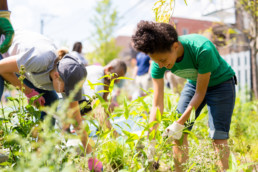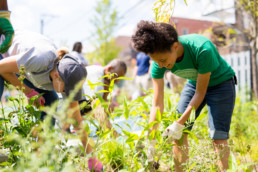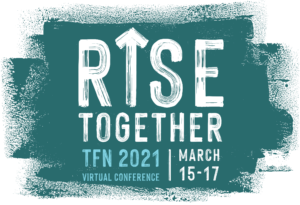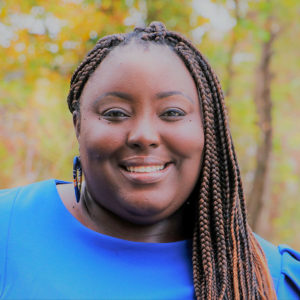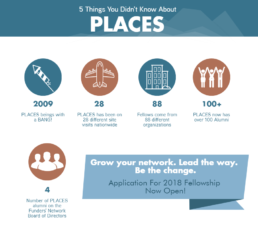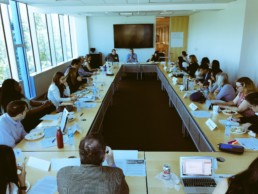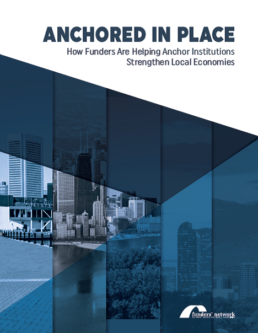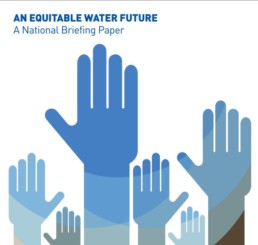New Grant Opportunities: Partners for Places grant applications now open!
BY TFN STAFF
The Funders Network (TFN), in partnership with the Urban Sustainability Directors Network (USDN), is pleased to announce the opening of the latest round of the Partners for Places grant program.
The deadline to submit proposals is Feb. 27.
The Partners for Places matching grant program improves communities by supporting equitable sustainability projects that build partnerships between local government leaders, frontline community groups and place-based funders in the U.S. and Canada.
National funders invest in local projects developed through these partnerships to promote a healthy environment, a strong economy and well-being for all residents.
Through these investments, Partners for Places fosters long-term relationships that make our communities more resilient, prosperous and equitable.
These matching awards provide partnership investments between $45,000 and $150,000 for one-year projects, or between $75,000 and $180,000 for two-year projects, with one or more local foundations required to provide at least a 50% matching grant.
Interested in applying? Access the application and resource documents below. (These resources are also available on our Partners for Places home page.)
Round 20 Application and Resources
- Invitation to Apply
- Application Form
- Budget Form
- Informational Webinar (3 p.m. ET Jan. 10): Register here.
Round 20 general Grant funds will support:
1. Spreading of local Equitable Climate Action (ECA) and/or Green Stormwater Infrastructure (GSI) practices.
2. Advancing opportunities for local government, frontline communities, and place-based funders to build trust and develop projects together.
The application deadline for Round 20 is Feb 27 (by 11:59 p.m., any time zone).
Please visit the Partners for Places webpage for more information.
Additional Resources
→ Read this feature story about Partners for Places in Inside Philanthropy here.
→ If you have questions about the Partners for Places program, please feel free to reach out to Ashley Quintana at ashley@fundersnetwork.org.
→ Where is Partners for Places making an impact? Read previous grant announcements and explore the Partners for Places Grantee Map here.
→ Where can I learn about completed Partners for Places projects?
Visit the Partners for Places Idea Bank to explore what grantees are doing, learning and sharing.
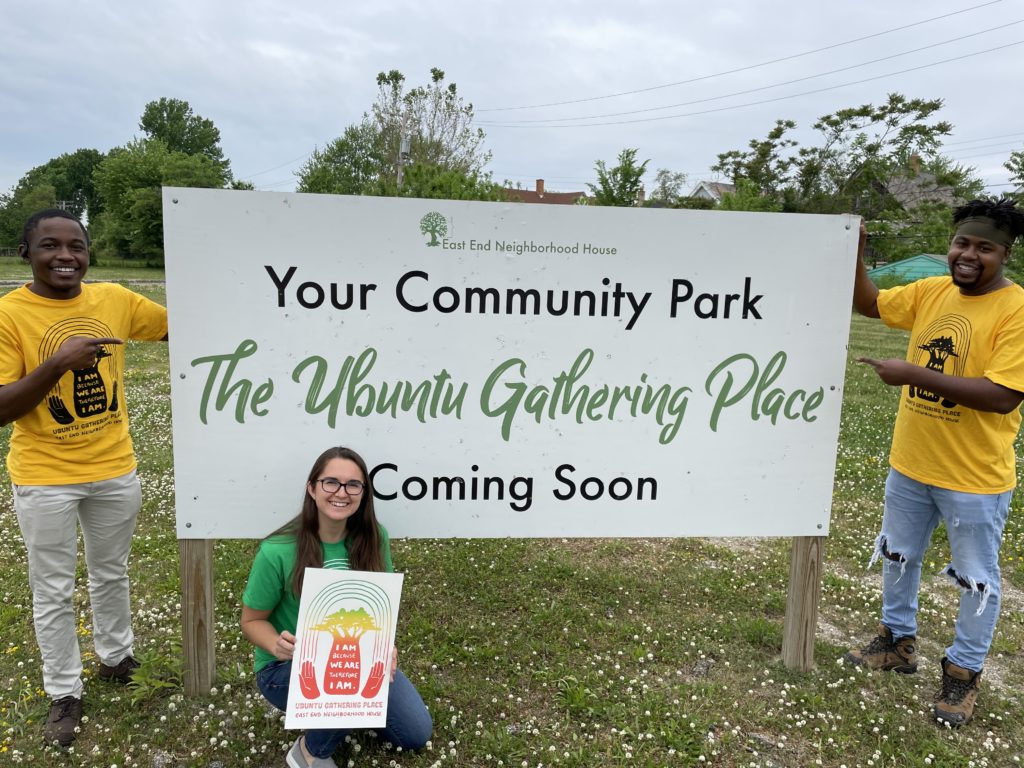
Rise Together: A message from our #TFN2021 Co-Chairs
BY Carmen James Randolph and Tené Traylor, #TFN2021 Virtual Conference Co-chairs
We are thrilled to announce that registration for The Funders Network 2021 Virtual Conference: Rise Together is officially open!
TFN’s virtual conference, which takes place March 15 to 17, 2021, will create a virtual space for funders to explore the strategies and stories that are creating more equitable, sustainable, and resilient places to live. This is work that has taken on increased urgency as we are called as a sector to help address the mounting challenges of a global pandemic, climate change, economic inequities and systemic racism.
Can we be bold and rise to this moment?
How do we help communities address and overcome the harsh, disparate impacts of the novel coronavirus in ways that are urgent and equitable?
How can we dismantle the systemic racism that touches every aspect of our lives — the food we eat, the air we breathe, the water we drink, and the places where we live, work and play?
And how do we use our privilege and power — as a sector and as individuals — to amplify calls for racial justice in ways that are meaningful, effective and authentic?
To say that 2020 has been a difficult year is an understatement. Those difficulties will not magically disappear with a new year or a new presidential administration.
That’s why we believe it is essential we find the time to access the tools, resources and insight that will lift us up and help us meet this moment.
Grounded in Racial Equity
In keeping with our 2021 Virtual Conference theme — Rise Together — our conference planning committee and TFN team have encouraged session ideas that are interdisciplinary, cross-cutting and grounded in racial equity.
TFN’s annual conference is the network’s signature event, bringing together diverse voices from across the sector as well as thought leaders, partners and practitioners to share their insight and expertise. In the weeks ahead, we’ll be sharing more details about our speakers and sessions. (You can see our At-a-Glance Agenda and Conference Highlights here.)
We also recognize that in this time of physical distancing, it’s important for us to find ways to connect with compassion, humanity and understanding. TFN will offer conference attendees an opportunity to take part in several Critical Conversations, facilitated peer-to-peer conversations that create a space for funders to explore difficult issues they may be working through personally or professionally (or both, as the lines between our work and home lives become increasingly blurred.) These Critical Conversations will hopefully allow us to have a frank and open exchange of ideas and experiences, and perhaps learn a little bit about each other in the process.
Work Together, Learn Together,
Rise Together
While we had originally hoped to come together in New Orleans, we will nonetheless find ways to lift up and learn from this amazing and resilient community as part of our virtual conference.
We are also seeking ways to minimize the economic impact of this decision, and will be highlighting opportunities to virtually visit local New Orleans vendors, artists and others in the community as part of our conference offerings. Stay tuned for the debut of our Shop Here! Virtual Market, where you’ll be able to order directly from NOLA-based small businesses as a way to support these local vendors — and perhaps treat a loved one (or yourself) to a meaningful gift.
And since we know burnout is a real thing, we’ll be building in opportunities for self-care, socializing and reflection with an agenda that includes Artist Interludes, Movement Breaks and a Cook Here! Funder Social Hour featuring a cooking demo from a New Orleans chef.
Bringing funders together is a year-round focus for TFN. Your registration fees and conference sponsorships help support the network's over-arching mission to leverage philanthropy’s unique potential to help create communities and regions that are sustainable, prosperous, healthy and just for all people.
These fees also help us offset programmatic and operational costs incurred in the planning and production of virtual events, including honoraria for invited nonprofit speakers, as well as underwrite registration for our 2020 PLACES Fellows.
As conference co-chairs, we want to acknowledge the hard work of TFN’s team and our 2021 conference planning committee, especially the New Orleans funders, in reimagining this year’s conference as an online experience.
We hope to see you — virtually of course — at TFN’s 2021 Virtual Conference: Rise Together on March 15 through 17.
About our TFN 2021 Virtual Conference Co-chairs
Vice President for Programs, Greater New Orleans Foundation
Fund Advisor, The Kendeda Fund

Featured Image: The City of Chicago recently received a Partners for Places grant to help transform schoolyards into green, engaging places to learn and play. TFN's 2021 Virtual Conference: Rise Together will explore the ways philanthropy can support more sustainable, prosperous and just communities for all people. Photo credit: Space to Grow.
Reflections From 2020: Lessons Learned From You
By Martha Cecilia Ovadia, Senior Program Associate for Equity Programs and Communications
This message originally appeared in the PLACES Connection Newsletter, which goes to the alumni of the TFN PLACES Fellowship.
We know it has been an incredibly difficult year. We could list all of the horror here today, but not only would that be redundant, the relentless nature of 2020 means that by the time this message reaches you, we may already need to add more to the list of things you have had to wade through. And the truth is, we see you. We have seen you working all year to survive and thrive on every front and we are so proud of the PLACES Alumni Network — not just this year, but every year.
But especially this year.
And so, we have decided that instead of closing out this year with a tacky message of “we made it!” when so many have not, we wanted to close out this year and cautiously welcome in 2021 in gratefulness and reflection. We wanted to share our reflections on what we have learned from YOU in 2020. And we hope you can tuck these into your back pockets as you reflect on the strength, courage, resiliency and humanity you have all shown this year — to your fellow practitioners, your communities, (chosen) families and yourselves. If you find yourselves struggling during this holiday/break, we ask you to remember these 4 things that you model for us and our network all year.

It’s Okay to Ask tor Help
You have all been dealing with significant trauma and mental hardship this year. It is understandable to feel alone, isolated and overwhelmed. And yet this year, more than any, we have seen you truly reach out for help, establish boundaries for your mental health and resiliency and commit to a real push in our sector to have conversations about normalizing mental health discussions and priorities, while also dismantling the ableism that came well before Covid-19 and 2020 but that must be eradicated in their wake. We thank you for still being here with us and for advocating for yourselves and others.

Slowing Down and Rest are Vital
When the pandemic first started, so many of us thought, “Look at all this time!” Many of us were able to put aside commutes. Many of us stopped traveling. And many of us naively said, "I will read more. I will take up a hobby or exercise.” And then the realities of the pandemic hit and we realized that a trivialized approach to rest — the one the sector and our economic system push so heavily as "self care" — would not do. When every call became a zoom meeting, and every office became a school and a daycare, and every minute of every hour was now available to be worked because home was work — we had to learn to slow down. We had to learn to say no. We had to learn to block out time: time for sleep, healing, grieving, loving and finding the will to stay the course in a way that was healthy but also set up equitable boundaries for yourselves and others. So many of you, over happy hours, emails and texts, have shared the many ways you have practiced (and failed and tried again) at slowing down and prioritizing your health. We thank you for your care of self.

Radical Joy is as Valuable as Righteous Rage
You have all felt so much over the last year (years, decades and centuries). And yet, when you think back on this year, amidst the chaos of civil unrest, a pandemic and our democracy in peril, may you also remember the laughs. May you remember the zoom calls with colleagues, (chosen) families and friends that reminded us that this is a world where our joy challenges the narrative of oppression as much as our bodies on the street protesting and mobilizing. Remember the joy hand in hand with the rage. You are not automatons and your resistance must reflect your full humanity. We have seen you celebrate births, career moves, marriages, adoptions, new puppies and so much more this year. We have seen you celebrate in spite of heavy hearts, refusing to hand over your humanity to the oppressor. And that, in turn, has lit our own fires to keep on fighting. We thank you for your joy and rage. It is when you bring your whole selves into this fight that we ourselves feel free to also fully inhabit our space in this fight.

Hope is a Learned Practice
And finally, it is radical to hope in this fight. And yet, like anything worth learning, you must practice it. And it is only with practice that it becomes easier and easier. Eventually, it becomes muscle memory — an integral part of who you are that you cannot exorcise out of you because you fought too hard to embed it. We thank you for keeping the light burning. We thank you on behalf of the PLACES team, The Funders Network and most importantly your communities, both professional and personal.
Mental Health Resources
In our commitment to normalize talking about mental health and tackling the ableism that silences so many, we want to share the following mental health resources with the PLACES Alumni Network. We hope that if you or yours need them, you will find them useful and you will seek safe harbor.
Mental Health Resources
1. Black Mental Health Resources
2. Indigenous Mental Health Resources
3. Latinx and Hispanic Mental Health Resources
4. LGBTQI Mental Health Resources
5. Men's Mental Health Resources
6. Women's Mental Health Resources
Mental Health Provider Directories
Inclusive Therapists: Virtual directory of culturally competent and social justice-oriented therapists; includes list of therapists currently offering reduced-fee teletherapy
Asian, Pacific Islander, and South Asian American (APISAA) Therapist Directory: Virtual directory of APISAA mental health providers
Latinx Therapy: Virtual directory of mental health providers for Latinx community
QTPoC Mental Health Practitioner Directory: Virtual directory of mental health practitioners across the country for queer and trans people of color, provided by the National Queer and Trans Therapists of Color Network
Black Emotional And Mental Health (BEAM) Virtual Therapist Network: Virtual directory of Black mental health clinicians who provide virtual (i.e. telemedicine) services
Boris Lawrence Henson Foundation Resource Directory: Virtual directory of mental health providers, programs and resource materials for the African-American community
Black Mental Health Alliance: Virtual directory of culturally-competent and patient-centered licensed mental health professionals
Melanin & Mental Health Directory: Virtual directory of culturally competent mental health clinicians for Black & Latinx/Hispanic communities
Therapy for Black Girls Directory: Virtual directory of culturally competent therapy providers for Black women and girls, searchable by location. Fellowships and financial assistance are available through the Loveland Foundation.
Therapy for Black Men Directory: Virtual directory of clinicians providing therapy for Black men
National Suicide Prevention Lifeline
Call: 800-273-8255
Text: HELLO to 741741
About The Author
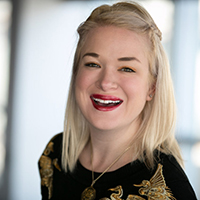 Martha Cecilia Ovadia is the Senior Program Associate for Equity Programs and Communications at The Funders Network. She is also a part of the TFN PLACES Fellowship team.
Martha Cecilia Ovadia is the Senior Program Associate for Equity Programs and Communications at The Funders Network. She is also a part of the TFN PLACES Fellowship team.
Watch: PLACES alum Mordecai Cargill on activating space and activating people
BY Martha Cecilia Ovadia, Senior Program Associate, Equity Programs and Communications
"We are committed to prototyping hopefully transformative innovative solutions to disrupting what we see as a vicious cycle of decline and degradation that primarily impacts communities of color," says PLACES alumni Mordecai Cargill to WKYC's Alexa Lee during their recent interview about advocating for equitable space and action for the people of Northeast Ohio.
Cargill, co-founder of ThirdSpace Action Lab with fellow PLACES alum Evelyn Burnett, recently spoke to WKYC about their mission to bring creative place-based solutions to complex socioeconomic problems. Both Mordecai and Evelyn see themselves as institutional and community organizers, turning multidisciplinary research into evidence-based strategies; and activating “third places” to co-creating more liberated spaces for people of color.
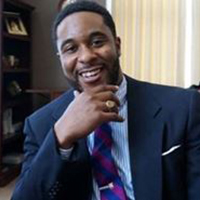 Cargill says their motivation do this work is grounded in the "opportunity to leverage the nascent momentum of a Northeast Ohio-based upswell of interest and engagement around topics of racial equity and inclusion — or I should say, the questions we were hearing from people across our civic ecosystem about the significance of structural racism as it impacts the work of community development, economic development, public education, municipal services."
Cargill says their motivation do this work is grounded in the "opportunity to leverage the nascent momentum of a Northeast Ohio-based upswell of interest and engagement around topics of racial equity and inclusion — or I should say, the questions we were hearing from people across our civic ecosystem about the significance of structural racism as it impacts the work of community development, economic development, public education, municipal services."
Watch the entire interview with WKYC here.
BONUS: To learn more Cargill and Burnett's work and journey as PLACES alumni, read their profile in the PLACES X: Stories of Impact project here.
New study warns coastal flood risks to affordable housing could triple by 2050
BY TFN STAFF
A new analysis released this week highlights the equity implications of sea level rise in an in-depth, nationwide assessment of risk to the country’s affordable housing supply.
The research — conducted by Climate Central, a New Jersey-based science organization supported by The Kresge Foundation, a TFN member — warns that the number of affordable housing units at risk from coastal flooding and sea level rise is expected to more than triple over the next three decades.
Affordable housing in California, New York, Massachusetts and New Jersey is notably vulnerable to potential flooding from the impacts of the climate crisis, including increasingly severe storms and rising sea levels, according to the report.
As part of the project, Climate Central has introduced an interactive online mapping tool showing the vulnerability of affordable housing to coastal flood risk now and in the future. The interactive threat maps allow you to view any area and its projected risk broken down by year, water level, temperature and affordable housing units. The data can be searched by zip code, city, county, state and by legislative and congressional districts.
To learn more about the report, related resources include the report summary and the scientific paper behind this report
Bonus: Read about the Climate Central analysis in the Guardian.

5 Things You Didn't Know About PLACES
Grow your network. Lead the way. Be the change.
Our PLACES Fellowship is a transformational leadership development experience that gives professionals in philanthropy the tools, knowledge, and best practices needed to embed an equity lens into their work.
PLACES fellows embark on a year-long process focused on creating more equitable neighborhoods and communities — and learning how to turn ideals into outcomes.
PLACES Fellows:
▪ Are dedicated to creating more equitable, diverse and inclusive neighborhoods and communities.
▪ Want to build peer relationships with other leaders in philanthropy.
▪ Have a broad range of philanthropic experience, come from diverse backgrounds, and hail from cities and communities both large and small.
▪ Are passionate about solving problems related to community, equity, and smart growth.
▪ Want to enhance grantmaking decisions in ways that are responsive to the needs and assets of historically marginalized communities, most specifically low-income neighborhoods and communities of color.
Learn More About PLACES:
▪ Meet our 2017 PLACES cohort.
▪ Visit the TFN blog for reflections written by PLACES fellows.
▪ Read about the PLACES Fellowship, and TFN's commitment to supporting the values of equity and inclusion.
The deadline to apply for TFN's 2018 PLACES Fellowship is Oct. 31, 2017.
Download an application here!
Linking Water, Equity, and Smart Growth in Los Angeles
On July 7th, 2017, the Los Angeles Funders’ Collaborative hosted its third annual funders’ lunch in partnership with Southern California Grantmakers. This year’s event focused on the intersection of water, equity, and smart growth-related issues.
Twenty-one funders attended the lunch, including several who already work on water-related issues, including including S.D. Bechtel, Jr. Foundation, the Water Foundation, and the Resources Legacy Fund.
Both the presentations by water experts and subsequent discussions yielded key insights on water-related issues in Los Angeles County that affect people, especially low-income communities of color.
Wade Crowfoot, CEO, the Water Foundation
- 85 percent of water in Los Angeles originates from four river systems, all of which are under stress.
- In Los Angeles County, the Water Foundation is supportive of a process that could yield significant public investment in stormwater infrastructure, which could help capture rainwater and create more greenspaces in low-income communities.
- Water quality and affordability need to be part of integrated water management solutions, such as the One Water movement, an ongoing strategy to break down siloes.
Liz Crosson, Water Policy Advisor, Office of Mayor Eric Garcetti, City of Los Angeles
- Mayor Eric Garcetti’s Executive Directive Number 5: Emergency Drought Response – Creating a Water Wise City sets ambitious targets to reduce water use in the City of Los Angeles.
- Los Angeles’ Sustainable City pLAn links to water-related issues in multiple sections of this report, including climate, environmental justice, green jobs, green infrastructure and resiliency.
- Water-related investments can yield a wide range of co-benefits, especially for communities and the environment.
Mark Gold, Associate Vice Chancellor for Environment and Sustainability, Sustainable LA Grand Challenge, The Institute of the Environment and Sustainability, UCLA
- Multi-benefit projects could also help Los Angeles achieve water self-sufficiency, which could both generate green jobs and improve the quality of life for all residents.
- Strategic water-related projects could be supported with funds from the recently passed park and transportation bonds in Los Angeles County (Measures A and M).
Ways Funders Can Engage on Water Issues
As with all gatherings of the Los Angeles Funders’ Collaborative, the agenda included a considerable amount of time for funders to ask questions and engage in a dialogue with the speakers. When asked how funders can learn more and make a difference, the speakers suggested the following:
- Support education related efforts such as #OurWaterLA
- Support research (the Water Foundation is supporting several water-related research projects)
- Attend future tours to learn more (the Water Foundation occasionally hosts these)
- Read the new paper on the optimization of water supplies in Los Angeles
- Read Toward Water Sustainability: A Blueprint for Philanthropy and learn more about the Water Funder Initiative
- Learn more about the Community Foundation Water Initiative, which is supported by Smart Growth California
To learn more about the Los Angeles Funders’ Collaborative, please contact Ron Milam.
New Report | Anchored in Place: How Funders Are Helping Anchor Institutions Strengthen Local Economies
A New Report From TFN's Anchor Institutions Funders' Group
Anchor institutions can play a vital role in strengthening and connecting local economies, and can serve as powerful drivers for building inclusive and equitable communities.
A new report issued this week by the Funders’ Network as part of our Anchors Institution Funders’ Group examines the potential these deeply rooted local enterprises hold to create lasting and sustainable change—and illustrates how funders are working with anchor institutions to create healthier, more equitable, and economically vibrant places to live and work.
Anchored in Place: How Funders Are Helping Anchor Institutions Strengthen Local Economies offers recommendations for funders looking to deepen and refine their strategies for working with anchors. In each of the profiled communities—Albuquerque, Baltimore, Chicago, Denver and the Twin Cities—the report shares stories of how funders are extending beyond traditional grantmaking roles to embrace their roles as conveners and leaders in their communities.
“Local and national funders can play an important part in supporting anchors work,” said Charles Rutheiser, senior associate at The Annie E. Casey Foundation and chair of TFN’s Anchor Institutions Funders’ Group. “This report explores how foundations are working with anchor institutions to leverage their local influence, build connections to the local community, and drive equitable and inclusive economic development.”
Although many people think of universities and hospitals when they think of anchor institutions, our research showed that many of the existing networks of anchor institutions are moving beyond a narrow definition and are expanding to include entities such as sports stadiums, libraries, museums, school districts, and municipal governments.
While individual anchor institutions hold enormous influence within their communities, networks of anchor institutions hold tremendous potential for making large-scale change. In 2017, TFN’s Anchor Institutions Funders’ Group commissioned a study to assess the extent and intensity of support for anchor work within philanthropy.
Anchored in Place: How Funders Are Helping Anchor Institutions Strengthen Local Economies details findings from that study, as well as offers insight and expertise from key leaders from foundations, anchor institutions, and other players. One key finding: Many foundations are actually already working with large local institutions in varying capacities, although don't always label that work "anchors" work. The graphic below illustrates what those surveyed identified as their top priorities when funding anchors work:
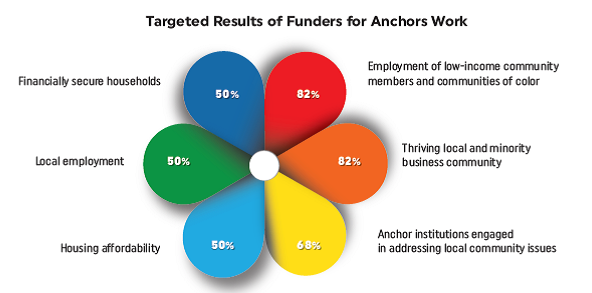
Read the full report below, or download here.
For more information about TFN’s Anchor Institutions Funders’ Group, please contact Alicia Kitsuse, program director for the Restoring Prosperity in Older Industrial Cities working group.
For a hard copy of Anchored in Place: How Funders Are Helping Anchor Institutions Strengthen Local Economies, please contact Tere Figueras Negrete, TFN’s director of communications.
Agents of Change: Scot Spencer of The Annie E. Casey Foundation on how PLACES shapes leaders of tomorrow.
Don’t take it from us—we want you to hear directly from PLACES alumni about how their experience as a PLACES fellow impacted their work, grew their understanding of equity work in philanthropy, and was an opportunity for personal growth and community learning.
The deadline to apply for a 2018 PLACES Fellowship is Oct. 31, 2017. Apply here!
The Next Generation of Thought Leaders
“As a funder, I have been personally invested in PLACES since the first class. The work at my foundation is increasingly focused on people and place and that’s what PLACES does—it helps funders who may be coming at smart growth from a different orientation and really adds the complex but necessary dimension of addressing the people who are directly affected by the results. And it does it in a way that centers on targeting investment resources towards the interests and needs of those families so that they can be part of the solution rather than apart from the solution. PLACES is about expanding the way that we think about smart growth in a way that’s more transformative for the communities in which we are working.
PLACES has always had its roots in making the connections between people and place. One aspect of the Fellowship that has really grown is the targeted addition of core leadership development training and coaching. We’ve enhanced the reach of what of PLACES does by embedding the knowledge that comes out of PLACES into foundations, by developing stronger leaders, and by strengthening the backing of supervisors to support their staff becoming fellows.
When you start something like a fellowship, there’s always a struggle to get participation, but the positive energy coming from the PLACES fellows is helping to grow the program organically. People are waiting to apply rather than TFN going to look for them. That growth in stature is because of PLACES’ effect, not just because of its popularity.
PLACES is nurturing the field leaders of tomorrow. PLACES provides the space for a diverse group of people to dive into those tough conversations about race and equity and then gives them the tools that they need to be not just an agent of change in their place, but a translator, a provider of the safe space themselves to open those conversations and move people towards action. PLACES opens up philanthropic leadership opportunities to funders from diverse backgrounds and helps elevate funders who come in at one place to move up to a different place.
PLACES alums are the next generation of thought leaders. They are assuming the leadership mantle where they work and in the field at large. Nowhere is that more evident than the four PLACES alums serving on the TFN board.”
Scot Spencer, TFN Board Member and PLACES Advisory Board Member
The Annie. E. Casey Foundation
Associate Director, Advocacy and Influence
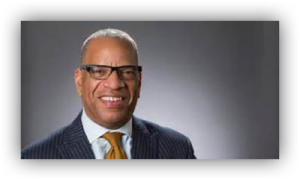 Scot Spencer leads the Foundation’s work in advancing community-focused policies, practices and strategies that increase opportunities for children, families and the places where they live and foster their success. Spencer also coordinates Casey’s local advocacy efforts in Baltimore.
Scot Spencer leads the Foundation’s work in advancing community-focused policies, practices and strategies that increase opportunities for children, families and the places where they live and foster their success. Spencer also coordinates Casey’s local advocacy efforts in Baltimore.
Before taking on these roles, Spencer managed Casey’s investments in East Baltimore, where the Foundation seeks to strengthen community and economic development in a historic, low-income neighborhood next door to the Johns Hopkins University medical campus. He previously was a transportation specialist at the Environmental Defense Fund, where he focused on state-level smart-growth policy and Commuter Choice, a local tax incentive for people who use transit. He also served as deputy director for Historic East Baltimore Community Action Coalition. There, he led the federal Bridges to Work demonstration, which provided job training and placement services for residents in East and West Baltimore, as well as transportation from their neighborhoods to employment centers in the suburbs. In addition, he worked for several years in private architectural practice, community development and university relations in upstate New York.
Spencer serves on a number of local and national boards, including The Funders’ Network for Smart Growth and Livable Communities and the Orton Family Foundation. He was the founding chair of the Maryland Commission on Environmental Justice and Sustainable Communities and served as co-chair of the Opportunity Collaborative, Baltimore’s regional plan development through the U.S. Department of Housing and Urban Development’s Sustainable Communities Initiative.
Water Alliance report a blueprint for more climate-resilient, equitable water systems
I heard about a young mother whose children were almost removed from her home because she couldn’t afford the water bill. I recall listing my home in Texas as a temporary shelter for people who had lost their homes to Hurricane Katrina flooding. And I continue to hear stories from rural America where water infrastructure is nonexistent, contaminated water is the norm, and raw sewage erupts from sewers into homes.
The increasing unaffordability of water, the disruption of families and communities, and lack of equitable water infrastructure are stark reminders that water is life. I often reflect on the words of Elder Mona Stonefish, an indigenous water leader from Canada, who reminded me “that none of us are greater than the other… because when we dip our hands in water, no one leaves any fingerprints… because the water belongs to all of us.”
We all deserve access to safe, healthy and affordable water. But water inequities persist across this country, and they are exacerbated by climate change. The manifestations of climate impacts include more drought, increased flooding, higher rates to repair neglected infrastructure, and health problems due to poor water quality. Climate change is no longer an inconvenient truth but a persistent reality for many communities across this country dealing with extreme changes in weather that can overwhelm water infrastructure. This new climate reality is hitting hard, particularly in low-income communities, communities of color and those living in climate vulnerable locations.
In a recently released national briefing paper, An Equitable Water Future, the US Water Alliance details how certain segments of society are more likely to live in low-quality housing, lack insurance, and possess fewer resources to cope with and recover from disasters. Those communities – which are disproportionately comprised of people of color – deal with the brunt of climate change impacts that extend way beyond the infrastructure. The ripple effects of climate change harm human health, hurt local economies and can tear asunder a community’s social cohesion.
So how do we face our new reality and foster community resilience in the face of climate change? One word: transformation. Transformation can be defined as changing form, appearance, nature, or character. In the water sector, this means changing our thinking, our policies and our physical and social infrastructure to both explicitly account for climate change and better reflect the needs and priorities of constituencies that until now have been ignored. The type of transformation we need must occur at all levels of government and in the public, private and nonprofit sectors. The briefing paper illuminates examples of how that change is occurring in fits and starts across the country, but these early efforts are just a beginning.
At The Kresge Foundation, our vision for climate-resilient and equitable water systems involves systems that are responsive to climate change, engage low-income communities in large-scale water planning, embed climate change into planning processes, and create paths for investments to build water infrastructure where needs are the greatest. The US Water Alliance, along with many of its partners, is critical to transforming the sector. It will take municipal and utility professionals, community-based leaders, scientists, engineers, water experts, policy makers and philanthropy to achieve true transformation.
We can begin by broadening the composition and cultural competency of influencers and decision-makers. It’s important that planners, operators, engineers, municipal leaders and utility managers understand and listen to community concerns, and that the community gain a better understanding of the context and constraints of the municipal side. With this enhanced understanding, my hope is that future decisions better reflect the input of impacted communities – accounting for social and economic factors alongside complicated water models and data.
Policy decision-making by water utilities and municipalities must include representation from low-income communities, communities of color, and those on the front lines of climate change impacts.
Transformation requires deepening our examination of ourselves and our role in water governance, funding, and resource distribution at all levels. I challenge us all to start by examining our individual biases; deconstructing institutional racism in the public, private and philanthropic sector; and reforming the policies and planning processes that perpetuate siloed decision making and fail to serve all community members equitably.
And most importantly, we must explicitly consider what we value, who we value and where we direct resources -- realizing accountability to all of our ‘customers’ is critical.
I am confident that we have the intellect, the resources and the creativity to operationalize the framework and foundation that has been offered by the US Water Alliance in An Equitable Water Future.
I’m sure we won’t see fingerprints in the water anytime soon. But I do expect to see the fingerprints of water leaders across this country on a scaling up and transformation to achieve climate-resilient, equitable water systems for all.
Check out the full post here.

